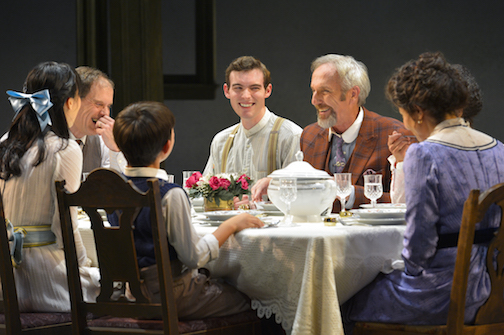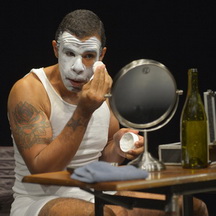
Ah, the wilderness of sentiment
For the most part, ACT puts on terrific plays, well acted and directed, with sophisticated productions. You can hardly miss going to a performance. Its current production of Eugene O’Neill’s Ah, Wilderness! falls short of expectation, however, and most of the problem has to do with the play itself.
Eugene O’Neill’s only comedy out of over 30 full-length plays, Ah, Wilderness! reveals why the playwright wrote so few. It lacks the joy that must exist somehow in even the darkest of humor. Sentimental, it is, however, and awkwardly idealized in the hopes and desires it presents.
Set on the Fourth of July, 1906, in a “big” small town in Connecticut, the play tells of a middle-class family and the modest trials it faces as its son Richard approaches adulthood. This is not the family of Long Day’s Journey into Night, the gripping study of familial wrongdoing that O’Neill wrote some 10 years later, and that has been understood as a version of O’Neill’s own unhappy past. Rather, it is what O’Neill described as “the way I would have liked my childhood to have been.”
This family, with its playful children and understanding parents, copes fitfully with the narcissistic struggles of young Richard, who is … heaven forbid … in love with young Muriel McComber. He funnels his desire and confusion into quotations from Keats, Oscar Wilde, and most of all Omar Khayyam: “A Jug of Wine, a Loaf of Bread—and Thou/ Beside me singing in the Wilderness—/ Oh, Wilderness were Paradise enow!”
Muriel’s father disapproves! And the object of Richard’s affection is grounded, forced to write a letter denying her affection to Richard. Muriel sneaks out to right the unjust act, and under a summer moon the two adolescents struggle with what it means to be innocents in love in middle-class New England at the turn of the last century.
This direct and simple storytelling is not the current fashion in plays, and it seems both cast and director struggled with how to play for the humor in the situation – a very different one from today’s Millennials. The most successful were Anthony Fusco, as the father, and Margot Hall, as the spinster Aunt Lily. Their low-key presentation of their characters hit the most natural note. Dan Hiatt, as the drunken failure who is constantly rejected and loved by Lily, also held the stage with grace, his part allowing for a bittersweet humor.
Thomas Stagnitta played Richard. Being a bit too old for the 17-year-old’s role, he was further hampered by how to present the character. Director Casey Stangl allowed him to play the role broadly, but not to good effect. The role of floundering teenager might have been more sympathetic if Richard had been played as less sulky and less foolish. Rosa Palmieri plays young Muriel with a quiet steadiness in the beach scene where young love has its chaste moment.
Even so, the audience laughed, and seemed happy with the play and the performance. A particularly sweet moment was the singing of songs by Richard’s older brother Arthur (Michael McIntire), as he tries to distract their mother (Rachel Ticotin) from worrying about her wayward son.
Ralph Funicello’s sets were strikingly gorgeous. Composed of transparent walls, the abstract rendition of the Miller family home gave a dreamy quality to story, as characters moved from room to room, moment to moment.
– Jaime Robles
ACT’s production of Ah, Wilderness! continues through November 8 at 415 Geary Street, San Francisco. For tickets and information, visit www.act-sf.org.
Photo: The Miller family at dinner in Ah, Wilderness!
